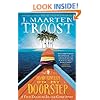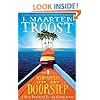
The Sex Lives of Cannibals: Adrift in the Equatorial Pacific
and over one million other books are available for Amazon Kindle. Learn more


Flip to back
Flip to front

The Sex Lives of Cannibals: Adrift in the Equatorial Pacific Paperback – June 8, 2004

$10.83
FREE Shipping on orders over $35.
Only 14 left in stock (more on the way).
Ships from and sold by Amazon.com.
Gift-wrap available.
NO_CONTENT_IN_FEATURE
Start reading The Sex Lives of Cannibals: Adrift in the Equatorial Pacific on your Kindle in under a minute.
Don't have a Kindle? Get your Kindle here, or download a FREE Kindle Reading App.
Don't have a Kindle? Get your Kindle here, or download a FREE Kindle Reading App.
Best Books of the Month
Want to know our Editors' picks for the best books of the month? Browse Best Books of the Month, featuring our favorite new books in more than a dozen categories.
Want to know our Editors' picks for the best books of the month? Browse Best Books of the Month, featuring our favorite new books in more than a dozen categories.
Product Details
Would you like to update product info or give feedback on images?.
|
Editorial Reviews
From Publishers Weekly
At 26, Troost followed his wife to Kiribati, a tiny island nation in the South Pacific. Virtually ignored by the rest of humanity (its erstwhile colonial owners, the Brits, left in 1979), Kiribati is the kind of place where dolphins frolic in lagoons, days end with glorious sunsets and airplanes might have to circle overhead because pigs occupy the island's sole runway. Troost's wife was working for an international nonprofit; the author himself planned to hang out and maybe write a literary masterpiece. But Kiribati wasn't quite paradise. It was polluted, overpopulated and scorchingly sunny (Troost could almost feel his freckles mutating into something "interesting and tumorous"). The villages overflowed with scavengers and recently introduced, nonbiodegradable trash. And the Kiribati people seemed excessively hedonistic. Yet after two years, Troost and his wife felt so comfortable, they were reluctant to return home. Troost is a sharp, funny writer, richly evoking the strange, day-by-day wonder that became his life in the islands. One night, he's doing his best funky chicken with dancing Kiribati; the next morning, he's on the high seas contemplating a toilet extending off the boat's stern (when the ocean was rough, he learns, it was like using a bidet). Troost's chronicle of his sojourn in a forgotten world is a comic masterwork of travel writing and a revealing look at a culture clash.
Copyright © Reed Business Information, a division of Reed Elsevier Inc. All rights reserved.
Copyright © Reed Business Information, a division of Reed Elsevier Inc. All rights reserved.
From Booklist
Although accustomed to globe trotting, Troost and his wife, Sylvia, were truly innocents abroad when they moved to the island of Tarawa in the South Pacific, where Sylvia had accepted a government position. Tarawa is the capital of Kiribati--a republic of tiny atolls located just above the equator--and the place where Troost's dreams of paradise were shattered. Although Tarawa has much to offer, such as stultifying heat, dogged bureaucracy, toxic water, La Macarena, and the fantastic rituals of the I-Kiribati people, it lacks running water, television, restaurants, air-conditioning, and, the most crucial amenity, beer. Culture shock ensued for Maarten and Sylvia, and he chronicles their two years on Tarawa in a hilarious, sardonic travelogue. Among the more memorable episodes is the time a simple fishing trip turns into a hunt for a giant thresher shark and when Troost blasts a Miles Davis CD to combat the incessant repetition of La Macarena. Troost's mystified admiration for the I-Kiribati people shines through it all, and readers learn how humor itself can be a necessary tool for survival. Jerry Eberle
Copyright © American Library Association. All rights reserved
Copyright © American Library Association. All rights reserved
More About the Author
J. MAARTEN TROOST is an international traveler whose essays have appeared in The Atlantic Monthly, The Washington Post, and The Prague Post. He spent two years in Kiribati in the Equatorial Pacific and upon his return was hired as a consultant by the World Bank. After several years in Fiji and Vanuatu, he recently relocated to the U.S. and now lives with his wife and son in California.
Customer Reviews
Most Helpful Customer Reviews
106 of 113 people found the following review helpful
By
Maudeen Wachsmith
VINE VOICE on February 27, 2005
Format: Paperback
2 Comments
Sending feedback...
You know how you feel when you've just finished a really good book and want to tell everyone you know about it? That is how I feel about THE SEX LIVES OF CANNIBALS. During the first few chapters I was laughing out loud so much and reading passages to my husband so often that he mentioned he wouldn't even have to read the book. However since he formerly lived in the Marshall Islands, this book hits home to him and he could hardly wait until I was done to grab it from my hands.
Maarten and Sylvia have no idea what they're getting themselves into when Sylvia agrees to a two-year contact to work on Tarawa, a remote island in the equatorial Pacific islands also known as Kiribas (The Gilbert Islands).
This was LOL funny in so many places! Maarten's turn of a phrase is so clever that he makes one laugh in the face of a nearly intolerable situation living on this remote island - part of which is so crowded it rivals Hong Kong in population density. The 20th century wasn't kind to these islanders. Their unique culture juxtaposed with the creations of the 20th century is very nearly ruining their culture. But Troost is able to find nearly everything funny (even though one wonders if he felt it was that funny at the moment) including the bowel habits of the natives. On the back of the book in Maarten's brief bio, it is revealed that he and is wife are living in California. One can only hope that he is becoming the writer for a sit-com. He makes other authors of humor/travel memoir seem dull in comparison. If I would compare him to anyone it would be Erma Bombeck-the way he is able to find hilarity in even the most mundane things.
This book deserves to be a bestseller and hopefully by word of mouth it will be.
Maarten and Sylvia have no idea what they're getting themselves into when Sylvia agrees to a two-year contact to work on Tarawa, a remote island in the equatorial Pacific islands also known as Kiribas (The Gilbert Islands).
This was LOL funny in so many places! Maarten's turn of a phrase is so clever that he makes one laugh in the face of a nearly intolerable situation living on this remote island - part of which is so crowded it rivals Hong Kong in population density. The 20th century wasn't kind to these islanders. Their unique culture juxtaposed with the creations of the 20th century is very nearly ruining their culture. But Troost is able to find nearly everything funny (even though one wonders if he felt it was that funny at the moment) including the bowel habits of the natives. On the back of the book in Maarten's brief bio, it is revealed that he and is wife are living in California. One can only hope that he is becoming the writer for a sit-com. He makes other authors of humor/travel memoir seem dull in comparison. If I would compare him to anyone it would be Erma Bombeck-the way he is able to find hilarity in even the most mundane things.
This book deserves to be a bestseller and hopefully by word of mouth it will be.
Thank you for your feedback.
If this review is inappropriate, please let us know.
Sorry, we failed to record your vote. Please try again
30 of 35 people found the following review helpful
By
Jessica Lux
on September 1, 2005
Format: Paperback
Comment
Sending feedback...
Troost and his wife truly do go to the end of the world, to a tiny country in the equatorial Pacific, and live in an alternate reality. Troot's misadventures with the town's hygiene and sanitation, the toxic fish, a complete lack of vegetation, limited dry goods, cannibalistic dogs, a rundown airplane, high seas on a plywood boat, and the like are relayed to the reader with humor and wit. Beer is popular because it "tends to be parasite-free and calorie-laden, two very useful attributes on Tarawa." At first, Troost is an outsider, shocked by the island going-ons, but over the course of his two years there, he truly adopts the island lifestyle, so much that America is a complete culture shock for husband and wife when the part ways with Kiribati.
Troost makes some insightful comments on infrastructure--he took for granted in his previous life that water and electricity came to your house by magic. On Kiribati, he has hilariously eye-opening experiences ensuring a supply of both.
Throughout the book Troost recounts the history of Kiribati, its culture, and its relationship to the outside world. He actually does a real service to the island by recording the oral tradition and myth, and placing it in context with the slim amount of published literature on Kiribati. Over the course of his stay, he grows to be a real defender of the nation. When Kiribati sincerely accepts the offer of a British drunkard to become their Poet Laureate, the global media has quite a laugh at the nation's quaint nature. Troost is certain to set the truth straight about the lout who only lasted a few months in Kiribati.
Troost makes some insightful comments on infrastructure--he took for granted in his previous life that water and electricity came to your house by magic. On Kiribati, he has hilariously eye-opening experiences ensuring a supply of both.
Throughout the book Troost recounts the history of Kiribati, its culture, and its relationship to the outside world. He actually does a real service to the island by recording the oral tradition and myth, and placing it in context with the slim amount of published literature on Kiribati. Over the course of his stay, he grows to be a real defender of the nation. When Kiribati sincerely accepts the offer of a British drunkard to become their Poet Laureate, the global media has quite a laugh at the nation's quaint nature. Troost is certain to set the truth straight about the lout who only lasted a few months in Kiribati.
Thank you for your feedback.
If this review is inappropriate, please let us know.
Sorry, we failed to record your vote. Please try again
51 of 63 people found the following review helpful
By
saskatoonguy
on October 16, 2004
Format: Paperback
2 Comments
Sending feedback...
The author describes living for two years in Kiribati, an ex-British colony in the Pacific Ocean that is now independent. He thought he was moving to a tropical paradise, but instead found that even in the national capital, people would regularly defecate in the lagoon, the grocery stores couldn't keep basic staples in stock, and water and electric supplies were irregular at best. He speaks of the Kiribati people with enormous and sincere affection, but a reader can't avoid the conclusion that these islands would be better off if they were still a British colony.
Troost writes in a light, humourous tone, making this book a pleasure to read, although there are places where Troost is a little too cute for his own good. A few photos would have been a nice touch, and is it asking too much for the publisher to include a map? And by the way, the title is misleading - there is very little here about sex and nothing about cannibalism. A book this good does not need the cheap gimmick of a misleading title.
Troost writes in a light, humourous tone, making this book a pleasure to read, although there are places where Troost is a little too cute for his own good. A few photos would have been a nice touch, and is it asking too much for the publisher to include a map? And by the way, the title is misleading - there is very little here about sex and nothing about cannibalism. A book this good does not need the cheap gimmick of a misleading title.
Thank you for your feedback.
If this review is inappropriate, please let us know.
Sorry, we failed to record your vote. Please try again
2 of 0 people found the following review helpful
By
teresa powers
on April 17, 2007
Format: Paperback
Comment
Sending feedback...
so much travel writing is heavy and dull. this book was funny and amusing and a delight because it wasnt the typical worship of third world peoples.
I also can tell you that his experience with temp agencies was right on the mark. He hands out the grim facts yet manages to make it entertaining .
I hope he writes more travel books. I would place it in the same catagory as " my family and other animals"
I also can tell you that his experience with temp agencies was right on the mark. He hands out the grim facts yet manages to make it entertaining .
I hope he writes more travel books. I would place it in the same catagory as " my family and other animals"
Thank you for your feedback.
If this review is inappropriate, please let us know.
Sorry, we failed to record your vote. Please try again
25 of 32 people found the following review helpful
By
FateJacketX
on September 20, 2006
Format: Paperback
7 Comments
Sending feedback...
One would think that "The Sex Lives of Cannibals" was a psychological reference book about the libidinous habits of Hannibal Lector and friends. Actually, it refers to the historical beginnings of the peoples on a remote Pacific island called Tarawa. The ancesters of those native to the atoll apparently lost their men to invading cannibals who went on to procreate with their women through force, creating a non-descript race of islanders. Not exactly what immediately comes to mind upon reading the title of J. Maarten Troost's first novel, a true story about his two year adventure on a small piece of land in the middle of the an endless bowl of water.
It all begins with Troost's lethargic approach toward his job. He's fed up with it. When his girlfriend Silvia is given the opportunity to work in a program designed to benefit the health and environment of the Gilbert Islands, Troost joins the unemployed and goes with her. Thus begins their whirlwind island lifestyle amid searing heat, lackluster living conditions, consistent health problems and just overall doing without. Many of their trials are humiliating, frustrating, inhuman and sad.
Tarawa has no waste disposal system so people relieve themselves in the ocean. Refuse piles up along its narrow roads and beaches, ignored. The author's cement, vermin-infested dwelling place is considered prime living compared to the thatched homes of the natives. Other countries bully them, depleting their only revenue of tuna by greedily fishing in Tarawa's coveted waters. They have no working fire trucks, have to use sticks instead of toilet paper and four hours of electricity isn't only a rare gift, but a pleasant surprise. Dogs are disease-ridden predators that prowl in huge packs, eating their own in sheer desperation.Read more ›
It all begins with Troost's lethargic approach toward his job. He's fed up with it. When his girlfriend Silvia is given the opportunity to work in a program designed to benefit the health and environment of the Gilbert Islands, Troost joins the unemployed and goes with her. Thus begins their whirlwind island lifestyle amid searing heat, lackluster living conditions, consistent health problems and just overall doing without. Many of their trials are humiliating, frustrating, inhuman and sad.
Tarawa has no waste disposal system so people relieve themselves in the ocean. Refuse piles up along its narrow roads and beaches, ignored. The author's cement, vermin-infested dwelling place is considered prime living compared to the thatched homes of the natives. Other countries bully them, depleting their only revenue of tuna by greedily fishing in Tarawa's coveted waters. They have no working fire trucks, have to use sticks instead of toilet paper and four hours of electricity isn't only a rare gift, but a pleasant surprise. Dogs are disease-ridden predators that prowl in huge packs, eating their own in sheer desperation.Read more ›
Thank you for your feedback.
If this review is inappropriate, please let us know.
Sorry, we failed to record your vote. Please try again











